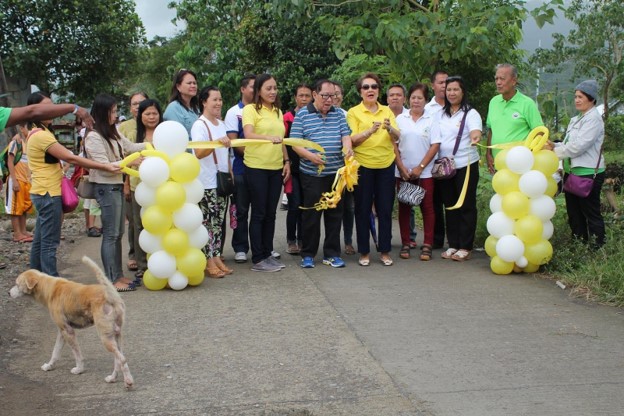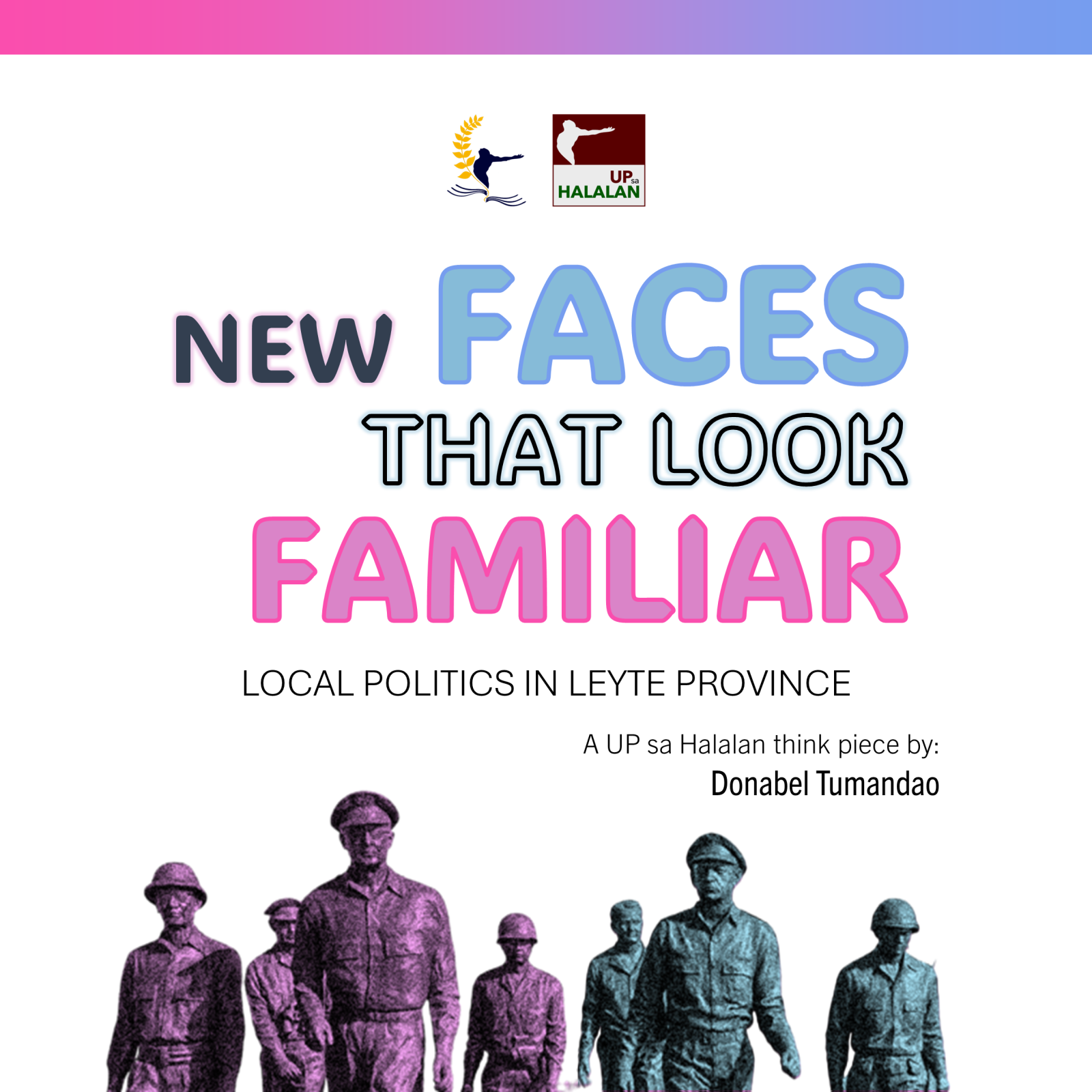Winning elections in Leyte remains an uphill battle, especially for non-dynastic, financially disadvantaged, and progressive candidates.

Despite re-democratization in 1986, the persistence and durability of political dynasties have continued to be a permanent fixture in Philippine politics. A study conducted by Rivera (2011) found that 72 out of 77 (94 percent) provinces have political families. In that same study, he identified 178 dominant political families of which 100 (56 percent) are from old elites who have been in power since the post-war period, and 78 (44 percent) are new elites who emerged in the post-Marcos period.
Following this national pattern, the political landscape of the province of Leyte is characterized by the presence and endurance of political dynasties like the formidable Veloso-Loreto-Cari-Petilla and Romualdez dynasties. However, recent elections saw the decline of some political families like the Apostols and Codillas which had ruled the second and fourth districts of Leyte respectively for at least two decades. While these political turnovers may appear at first to have caused a dent in dynasticism in the province, it did not really open up local contests to non-dynastic and/or alternative candidates as the challengers were either very wealthy political neophytes tempted to start their own political dynasties or are already members of a political family aspiring to expand their influence.
This piece will focus on the case of the Second District of Leyte to briefly show how the rise to power of some new faces in local politics is nothing but familiar as they also ended up morphing into the same political families that they had replaced. This contributes to the perpetuation of dynastic politics in the province.
New faces that look familiar
The Second District of Leyte had been ruled by the Apostol political family for at least 24 years. The congressional seat was controlled by the Apostols from 1992 until 2016 wherein Sergio “Serging” Apostol (1992-2001; 2010-2016) and Ebbie Apostol (2001-2010) took turns in holding the seat after their three-term limit expired. The patriarch, Serging Apostol, is a political veteran who, through his role as one of the prosecutors in the impeachment trial of former president Joseph Estrada, managed to establish ties with former president Gloria Macapagal Arroyo (GMA). He was appointed by GMA in 2001 as President, CEO, and Chairman of the Board of the Philippine National Oil Company-Energy Development Corporation (PNOC), and in 2006 as Presidential Chief Legal Counsel.
The matriarch, Ebbie, was also a former Leyte vice-governor (1998-2001), a former mayor of Carigara (2010-2013), and a member of the provincial board since 2016 currently serving her third consecutive term. In 2004, their daughter Anlie entered politics and served as mayor of Carigara for two terms (2004-2010) and was later elected as a member of the provincial board (2010-2016).
The two-decade dominance of the Apostols in the Second District of Leyte was dismantled by the entry of the wealthy Ong brothers, the late Eduardo “Boy” Ong Sr. and Henry Ong. The Ong family owns the supermarket chain, Cherry Foodarama, which was established in 1952 and is considered one of the pioneers in the domestic retail industry in the country but was acquired by SM Investments Corporation (SMIC) in 2015. The late Boy Ong Sr. first won as mayor of Carigara in 2013 against Tonette Apostol, another scion of the Apostol family, and was later re-elected in 2016 against Anlie Apostol. In 2016, his younger brother, Henry, managed to unseat then-congressman Sergio Apostol.
The rise to power of the Ong brothers suggests that they would build their own dynasty. In 2019, Boy Ong’s son, Eduardo Ong Jr. who was then a 22-year-old fresh graduate of Business Management, ran and won as his father’s vice-mayor in the midterm election. Boy, who vied for his third consecutive term in 2019, was grooming his son to replace him as mayor in the 2022 election. Indeed, they managed to swap positions, and his son is now the local chief executive while he served as his vice-mayor until his sudden passing in December 2022.

Teehankee (2001) suggests that political clans who rose to power tend to engage in the same traditional practice of politics performed by the older political families that they had replaced. The longer new clans stayed in power, the more resources they could accumulate, giving them more power and influence which they could utilize against any attempt for a political comeback from the previous political dynasty or any challenger for that matter. In an attempt to prevent the Ongs from enjoying a prolonged incumbency and the advantages that could arise from it, Lolita Karen Javier who belongs to the affluent Javier clan from the fourth-class municipality of Javier in the fifth district of Leyte, thwarted Henry’s re-election bid. The political rise of the Javiers was initiated by the patriarch, Leonardo “Sandy” Javier Jr., the CEO and owner of Andok’s Corporation, a chain of stores known for its roasted chicken nationwide.
In 2010, Sandy won the mayoral election against then-incumbent mayor Joel Cua of the Cua dynasty which had ruled the municipality for three decades. He then started to build his own political dynasty as his son, Michael Dragon Javier, entered politics in 2016 and won as his vice-mayor. Mayor Sandy Javier also immediately established close ties with local government leaders in Leyte when he became the president of the League of Municipalities both at the provincial and national levels. The Javiers then managed to expand their family’s political power beyond the small town of Javier by winning other key posts in the province. After the 2022 elections, Sandy Javier is now the vice-governor of Leyte, Lolita Karen Javier won her re-election as congresswoman of the Second District of Leyte, and her son, 24-year-old Jassie Tañala, won as mayor of Jaro, Leyte. Meanwhile, Michael Dragon Javier is currently serving his second term as mayor of Javier, Leyte.

In addition, the entrance to local politics of economic elites like the Ongs and the Javiers, families with business interests at the national level, can be viewed as their way of adapting to changes in business industries in order to maintain, expand, or diversify their economic interests. By building a political dynasty at the local level, they will be able to broaden their political network, increase their sphere of influence, and enhance their ability to pursue their economic interests. Such diversification reduces their vulnerability to possible economic fluctuations or political transitions that may impact their businesses.
Give a chance to others?
That the challengers who successfully defeated dynastic politicians in the province are very wealthy implies that local electoral dynamics in Leyte will most likely remain largely dominated by political families and even by economic elites turned political elites, leaving little space for progressive and non-dynastic candidates who, bereft of resources needed to win elections, are no match to dynastic candidates.
In addition, poor socio-economic conditions in the district and in the province affect voters in that it creates a sense of dependency on dynastic politicians who can control resources and selectively dispense patronage for their supporters. Voters might vote for candidates who could be alternative patrons to the sitting political dynasty. As such, a strong challenge against a political dynasty may come from viable candidates who belong to the same higher economic class and who have the resources to match wealthy political dynasties and employ patronage politics and clientelism to get electoral support. Winning elections in Leyte will thus remain an uphill battle, especially for non-dynastic, financially disadvantaged, and progressive candidates.
However, while there is continuity in dynasticism in the Second District of Leyte with the rise of the Ongs and Javiers, there is a notable change in the district in that the rivalry between Henry Ong and Lolita Karen Javier has made congressional elections more competitive compared to the very lopsided contests previously won by the Apostols against financially disadvantaged challengers. In the context of the upcoming barangay elections, these wealthy political families capable of being generous patrons will support their specific candidates through political endorsements and financial assistance. This could potentially extend the competitiveness to the barangay level as challengers to incumbent officials would have alternative support coming from either Ong or Javier.
Donabel S. Tumandao is an MA Political Science graduate from UP Diliman and an Assistant Professor at UP Tacloban. This opinion piece is based on her MA Thesis “Vulnerability of a Political Dynasty and the Entry of Strong Challengers: The Case of the Apostol Political Family in the Second District of Leyte” (2023).
